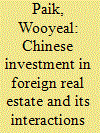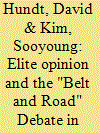|
|
|
Sort Order |
|
|
|
Items / Page
|
|
|
|
|
|
|
| Srl | Item |
| 1 |
ID:
163467


|
|
|
|
|
| Summary/Abstract |
Since the early 2000s, a great tide of Chinese "go outside" (zouchuqu), or outbound foreign investment, has happened in many regions and industries of the world. Among these, real estate has emerged as one of the most rapidly increasing outbound investments from China in the 2010s. As a result, Chinese investors, both enterprises and individuals, have had an extensive and growing impact on host states and societies, which are largely developed and democratic. This study analyzes the multifaceted interactions between Chinese foreign real-estate investors and host states and societies using the case of Jeju Province in South Korea from 2010 to 2018. More specifically, it analyzes the responses of the host country's national and local governments, as well as its grassroots civil society, to the soaring and often unconstrained Chinese investment in its real estate, focusing on the role of a host country's democratic institutions.
|
|
|
|
|
|
|
|
|
|
|
|
|
|
|
|
| 2 |
ID:
163466


|
|
|
|
|
| Summary/Abstract |
This article analyzes elite opinion in South Korea as it applies to China's One Belt, One Road initiative (OBOR), in order to better understand how a prominent Asia-Pacific middle power and US ally is approaching this development. Through a close analysis of the writing of foreign-policy elites in South Korea from 2013 to 2017, the study finds that OBOR was generally depicted as significant to China's re-emergence in regional and global affairs, but not as wholly detrimental to South Korean interests. Elites did not speak with one voice, but presented the government with a comparatively sanguine view of OBOR. The debate, we illustrate, created unlikely alliances between left- and right-leaning elites about some aspects of the initiative, but it also revealed tensions among conservative and centrist elites. In seeking to demonstrate their relevance to policy makers, however, elites inadvertently underlined their growing distance from the general public.
|
|
|
|
|
|
|
|
|
|
|
|
|
|
|
|
| 3 |
ID:
163468


|
|
|
|
|
| Summary/Abstract |
While international and Pacific scholarship suggests that communities can play a significant role in improving access to schooling as well as school funding, infrastructure, and resources, there is little research on how school-community relations shape the implementation of fee-free education policies. This is particularly the case in the Pacific region. In Papua New Guinea, communities play a significant role in determining school funding, infrastructure, and access, but their role in implementing the country's fee-free education policy (introduced in 2012) is poorly understood. Drawing on data from two provinces with very different capacities for service delivery, this paper shows that school-community relations vary significantly, and are crucial for managing challenges associated with the country's tuition fee-free (TFF) policy, particularly in regards to access to schooling and improving school funding, infrastructure, and resources. While communities have helped advance the TFF policy's goals, conflict over land, the charging of fees, and the board of management (BOM)—a key local governance body—has, in some cases, undermined national efforts to increase enrollments and make up for the loss of school income from tuition fees. This paper argues that academics and policy makers need to pay greater attention to the sustainability of fee-free education policies, geographical variation, and the improvement of school-community relations. Doing so will require overcoming the tendency to focus on national-level indicators of success associated with fee-free education policies.
|
|
|
|
|
|
|
|
|
|
|
|
|
|
|
|
| 4 |
ID:
163465


|
|
|
|
|
| Summary/Abstract |
The Belt and Road Initiative (BRI) is often regarded as a vehicle of China's economic statecraft in that country's endeavour to expand its geopolitical influence overseas through investments and trade. In today's globalized world, however, the vast majority of international economic interactions are conducted by firms, not states. The success of the BRI therefore depends on whether and how China can compel its firms to behave in a way that serves the strategic interests of the state. Using a unique firm-level survey, we find that Chinese firms' interests in the BRI do not necessarily align with those of the state. Despite similar perceived risks and challenges to participation in the BRI among private and state-owned firms in China, state-owned enterprises are much more likely than private ones to express a willingness to participate in the BRI. These findings highlight the importance of state control in the exercise of economic statecraft.
|
|
|
|
|
|
|
|
|
|
|
|
|
|
|
|
|
|
|
|
|